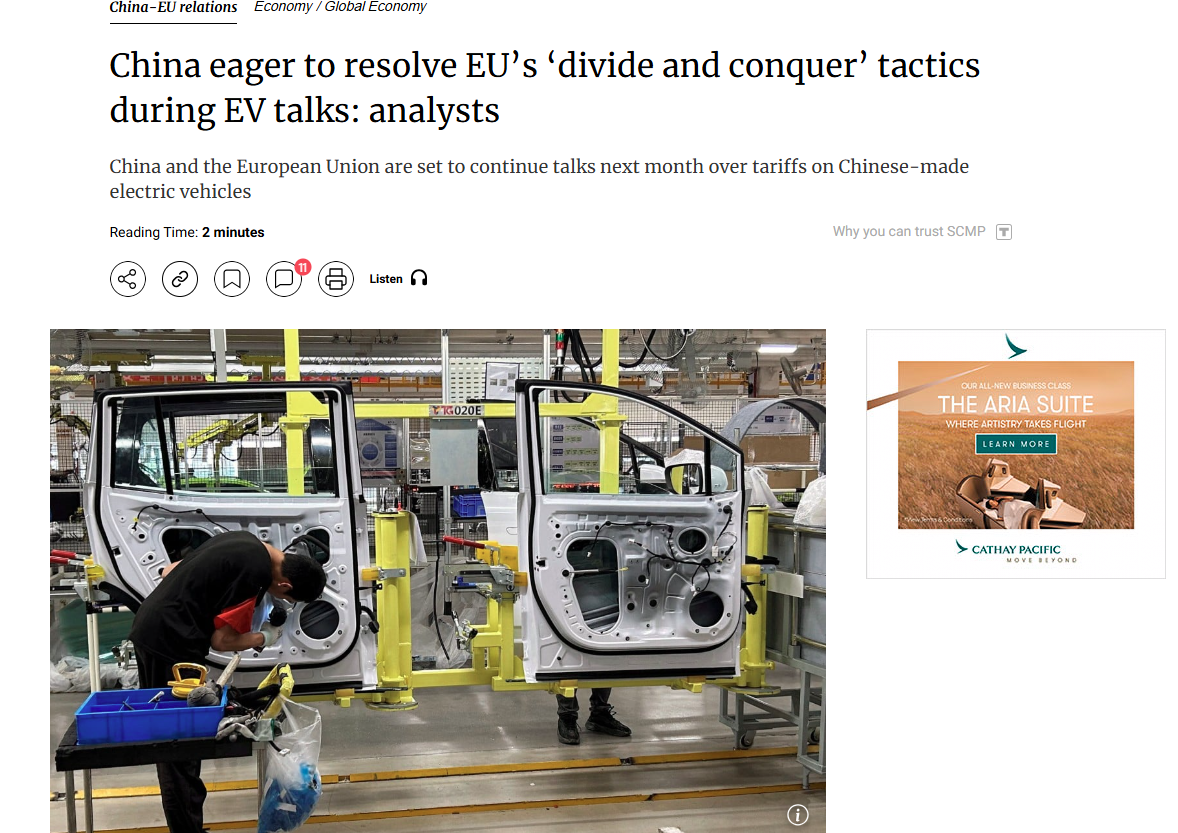LATEST INSIGHTS
Your Present Location: LATEST INSIGHTSWang Yiwei: China eager to resolve EU’s ‘divide and conquer’ tactics during EV talks: analysts
Source: South China Morning Post Published: 2024-10-29

By Frank Chen
China is anxious to fend off the European Union’s “divide and conquer” tactics during their electric vehicle (EV) tariff negotiations to maintain a united front and steer future talks, analysts said.
Chinese EV manufacturers should, they added, also not be influenced as the EU insists on the right to approach firms individually.
China and the EU have said that headway has been made, with both sides set to continue exchanges next month, focusing on price commitments.
But separate discussions that bypass Beijing’s overall strategising may complicate collective talks as they enter a crucial stage, analysts said.
“This is the EU’s bid to lure some Chinese EV firms to transfer tech and production,” said Wang Yiwei, director of the Institute of International Affairs at the Renmin University of China.
“The bloc may dangle lower tariffs or other favourable treatments in one-on-one interactions.
“If so, cracks will appear in Beijing’s overall response to tariffs at this important juncture.”
The bloc’s punitive import tariffs of up to 35.3 per cent on Chinese-made EVs are set to kick in by the end of the month, capping a year-long anti-subsidy investigation.
“There must be discipline in place for the sake of future negotiations and the sector’s common interests and only semi-official industrial chamber can represent the overall position of the industry [in collective talks],” added Wang, who is also a former diplomat at the Chinese Mission to the EU.
He added that China’s strength in the EV industry has evolved from national strategies and a complete industrial chain.
“An individual producer may no longer be competitive once it acts on its own,” he said.
China’s Ministry of Commerce on Monday warned against separate talks, saying they would undermine trust and continued efforts to resolve the issue.
An official from the ministry said the China Chamber of Commerce for Import and Export of Machinery and Electronic Products is the sole representative with full authorisation from Chinese enterprises to propose a price commitment plan.
The European Commission said on Friday that it has a “legitimate right” under World Trade Organization (WTO) rules to approach individual Chinese EV firms involved in the investigation and that its talks with the semi-official Chinese chamber do not exclude other interactions.
Beijing, though, warned that concurrent and separate negotiations would make future implementation and supervision of the price commitment agreement more costly.
Minister of Commerce Wang Wentao made China’s point clear in a video conference with European Commission executive vice-president and trade chief Valdis Dombrovskis on Friday.
The State-owned GAC Group and New York-listed EV maker Xpeng have vigorously refuted groundless rumours that they had huddled together with EU negotiators to explore separate deals, and vowed to always act in the overriding interests of the entire sector.
Huo Jianguo, vice-president of the China WTO Research Association, said the EU should also realise that the chamber’s sole presence in talks could ensure implementation.
“China had already proposed a price commitment plan in August. Once a universal deal is signed with the EU, the chamber can ensure it will apply to all manufacturers,” Huo said earlier this month.
“Companies should avoid unilateral actions and the EU should demonstrate its goodwill and maintain a good negotiation environment.”























































































 京公网安备 11010802037854号
京公网安备 11010802037854号





